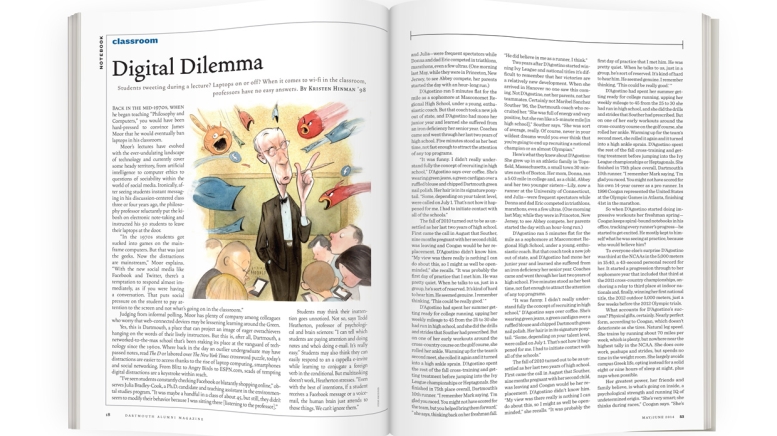Back in the mid-1970s, when he began teaching “Philosophy and Computers,” you would have been hard-pressed to convince James Moor that he would eventually ban laptops in his classroom.
Moor’s lectures have evolved with the ever-undulating landscape of technology and currently cover some heady territory, from artificial intelligence to computer ethics to questions of sociability within the world of social media. Ironically, after seeing students instant messaging in his discussion-centered class three or four years ago, the philosophy professor reluctantly put the kibosh on electronic note-taking and instructed his 50 students to leave their laptops at the door.
“In the 1970s students got sucked into games on the main-frame computers. But that was just the geeks. Now the distractions are mainstream,” Moor explains. “With the new social media like Facebook and Twitter, there’s a temptation to respond almost immediately, as if you were having a conversation. That puts social pressure on the student to pay attention to the screen and not what’s going on in the classroom.”
Judging from informal polling, Moor has plenty of company among colleagues who worry that web-connected devices may be lessening learning around the Green.
Yes, this is Dartmouth, a place that can project an image of eager overachievers hanging on the words of their lively instructors. But this is, after all, Dartmouth, a networked-to-the-max school that’s been staking its place at the vanguard of technology since the 1960s. Where back in the day an outlier undergraduate may have passed notes, read The D or labored over The New York Times crossword puzzle, today’s distractions are easier to access thanks to the rise of laptop computing, smartphones and social networking. From Blitz to Angry Birds to ESPN.com, scads of tempting digital distractions are a keystroke within reach.
“I’ve seen students constantly checking Facebook or blatantly shopping online,” observes Julia Bradley-Cook, a Ph.D. candidate and teaching assistant in the environmental studies program. “It was maybe a handful in a class of about 45, but still, they didn’t seem to modify their behavior because I was sitting there [listening to the professor].”
Students may think their inattention goes unnoticed. Not so, says Todd Heatherton, professor of psychological and brain sciences: “I can tell which students are paying attention and doing notes and who’s doing e-mail. It’s really easy.” Students may also think they can easily respond to an a cappella e-invite while learning to conjugate a foreign verb in the conditional. But multitasking doesn’t work, Heatherton stresses. “Even with the best of intentions, if a student receives a Facebook message or a voicemail, the human brain just attends to those things. We can’t ignore them.”
No one has called for a policy governing the use of laptops in class. But William Garrity, associate chief information officer in the academic computing department, reports that some professors have wished for “a magic switch at the podium that would shut off the network in their room.” Even if that were technologically feasible, it’s no magic bullet. “You’d also have to disable cell phone coverage to actually make the room completely dark,” says Garrity. After all, students use smartphones as pocket-size computers and for texting.
Another approach tries to harness the technology at hand. In spring 2009, for instance, music professor Michael Casey, Adv’92, began requiring student postings to a course Facebook page during class. Seventy-seven of the original 81 students are still “members” of the page—not a bad stat in terms of alumni networking. Still, Casey isn’t convinced the app has higher-ed value. “Privacy issues dog Facebook’s usefulness as an educational tool,” he says. “For example, it probably isn’t that cool to be seen keenly participating in a class by all of your ‘friends.’ ”
Lee Witters, who teaches at the College and Medical School, says he watched the latter institution adopt an informal no-knitting-in-class rule more than a decade ago after a profusion of scarf-makers began disrupting classes with their clicking needles. (Officially, the Med School bans only bringing pets to class.) So at the advent of social networking, the professor of biochemistry tried to finesse it. First he had students use Twitter in class. The application’s server proved too slow to keep up (this was several years ago), so Witters began having students participate virtually via cloud-based spreadsheets on Google. He can pose a broad question, have students post narrative, anonymous responses and discuss the results in real time. Are students more engaged? “Absolutely,” says Witters.
Apart from an obscure provision banning food and drink in classrooms—a rule that few on campus seem to be aware of—the College doesn’t dictate what students can or can’t tote to class. But will web-enabled devices become the exception?
According to a recent poll by the Chronicle of Higher Education and Pew Research Center, 56 percent of U.S. colleges leave digital device policies up to individual professors. Adrian Randolph, associate dean of the faculty for arts and humanities and a professor of art history, says he banned laptops longer ago than he can remember but suspects Dartmouth will remain flexible. “I wouldn’t encourage a blanket policy on this,” he says. “It seems to me that teaching is just too varied across disciplines.”
As Caitlin Nicholson ’12 suggests, an all-out wi-fi ban would likely cause an uprising: “I think students would revolt.”
Kristen Hinman is a journalist based in Washington, D.C.




